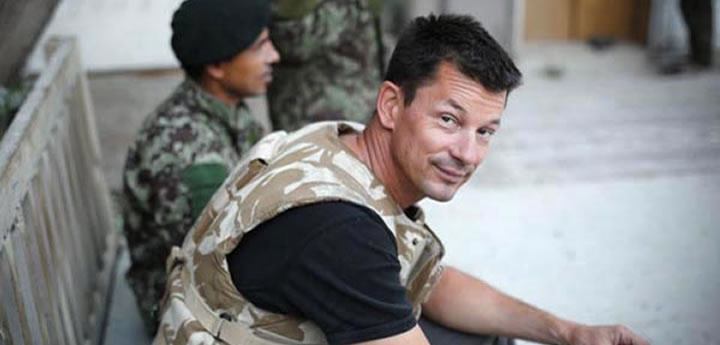Following the first US air strikes on Islamic State (IS) positions in Syria, the Islamist group has released a second propaganda video featuring the kidnapped British journalist John Cantlie.
Following a similar format to the previous video featuring Cantlie, the reporter speaks directly to the camera wearing an orange jumpsuit from indoors at an unknown location.
Speaking under coercion in the video, titled “Lend Me Your Ears and Messages From The British Detainee John Cantlie: Episode 1”, the journalist said that Western governments underestimated “the strength and fighting zeal of the opponent” and asks “what is this latest ill advised foray really supposed to achieve?”
[spoiler title=”Transcript of video”]John Cantlie:[/spoiler]“Hello there, I’m John Cantlie the British citizen abandoned by my government and a long term prisoner of the Islamic State.
In this programme we’ll see how the Western governments are hastily marching to all out war in Iraq and Syria without any heed for the recent past and how they are using the persuasive approach to lure the public back into the conflict.
So, let’s get straight to the point with a quote from former CIA chief turned vigorous anti-intervention campaigner Michael Scheuer:
“President Obama does not have the slightest intention of defeating the Islamic State” he says “which would require the aerial slaughter and boots-on-the-ground demolishing of the mujahedin”.Michael Scheuer, whose knowledge of the Muslim nations and the complexities of their society is considerable, adds “18 years into our war with the Islamists, the US has given no public signs that it has the slightest awareness of what its enemies are fighting for”.
Now, there are two solid points here. The Obama administration is so perplexed as they march back into Iraq but they’re tap dancing around the issue in a “we’re getting involved but we’re not really getting involved” kind of way. You know, air strikes only, no troops on the ground, limited operation time, no mission creep. All those pre-combat agreements that tend to get forgotten after the first six months of the nasty tough stuff.
The pre-9/11 Afghans are already back in control of large areas of Afghanistan, while the full might of the American war machine couldn’t destroy the Islamic State in Iraq before.
So, now the State is far stronger than ever it was – what is this latest ill-advised foray really supposed to achieve?
And Scheuer’s second point is aptly made. As ever, the entire reason as to why we’re at war with the Islamists and what they’re fighting for is brilliantly avoided by all.
Senior US politicians seem content to call the Islamic State nasty names: awful, vile, a cancer, and insult to our values. But such petty insults don’t really do much harm to the most powerful Jihadist movement seen in recent history.
That the Western governments were caught napping by the sheer speed of the Islamic State’s growth is now a given. “Intelligence officials failed to anticipate the emergence of the Islamic State”, says Tom Keen, a former new jersey governor. “We certainly didn’t anticipate them going across the border into Iraq and declaring themselves a Caliphate.”
Obama and his allies were well and truly caught by surprise.
The president once called George Bush’s Iraq conflict “a done war” and couldn’t wait to distance America from it when he came into power. Now he’s being inexorably drawn back in, but he’s at pains to point out that this is not the equivalent of the Iraq war. Indeed, it’s far more complicated and prone to failure.
There is a newly elected pro-American/Iranian regime in Iraq. They await eagerly for further American intervention to strengthen the Iranian crescent in the Middle East.
But the appointment of a new puppet is an important piece of the puzzle in America’s “Gulf War III” as it allows them to get involved quickly via a proxy. Iraq’s leaders should know that “the United States will stand should-to-shoulder with Iraqi’s as they implement their national plan” gushed John Kerry on 9 September. Meaning our national plan to tackle the Islamic State.
Everyone now is getting involved: Denmark and France have sent air power; Britain is arming the Kurds; Iran is sending troops; contractors are being sought in Iraq; and even Bashar al-Assad, until earlier this year the most hated in villainised tyrant in the Arab world, is being approached for permission to enter Syria.
“Can the Islamic State be defeated without addressing that part of their organisation that resides in Syria?” asks General Martin Dempsey. The answer is no.
It’s all quite a circus. Air strikes, the creation of last minute puppet governments, advisory teams on the ground, wooing previous enemies to join in, and trans-border incursions into a country that has been in a state of civil war for three years. All the while completely underestimating the strength and fighting zeal of the opponent. Not since Vietnam have we witnessed such a potential mess in the making.
Current estimates of 15,000 troops needed to fight the Islamic State are laughably low. The State has more mujahedin than this. And this is not some undisciplined outfit with a few kalashnikovs.
We started with Michael Scheuer, so let’s give him the final word for now:
“Think what you will of the Islamists and their brand of war-making”, he says, “but they been in the field fighting since 1979 and their movement has never been larger, more popular, or as well armed as it is today”.Join me again for the next programme.”
Cantlie was previously kidnapped when crossing into Syria near Bab al Hawa on 19 July 2012, but was rescued after seven days of torment and mock executions by a Free Syrian Army unit.
Despite his ordeal, Cantlie soon returned to Syria to continue reporting on the bloody civil war but went silent soon after crossing the border in late 2012 and he was presumed kidnapped.
The photojournalist and correspondent was reportedly sold to IS in a group of kidnapped westerners that included James Foley, the US reporter killed by IS in the first propaganda video.
He is now believed to be held in Raqqa, Syria, the de facto capital of the Islamic State along with other kidnapped western journalists and aid workers.




